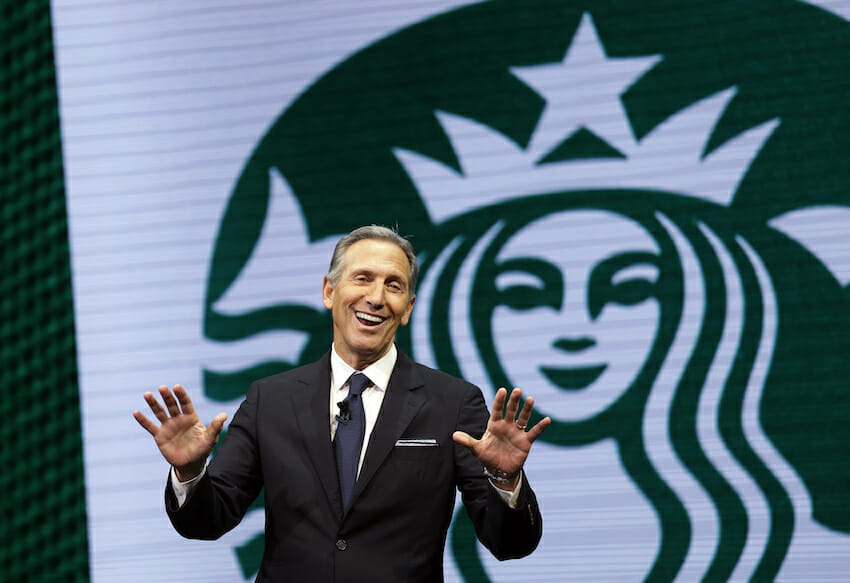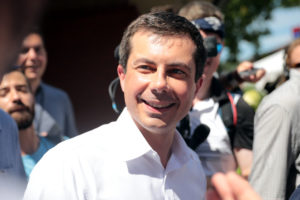Beware the Democrats and Their Good Billionaires
Outgoing Starbucks CEO Howard Schultz’s political prospects may have dimmed, but his genre of bogus austere responsibility lives on in his party of choice. Starbucks CEO Howard Schultz speaks at the Starbucks annual shareholders meeting in Seattle in 2017. (Elaine Thompson / AP)
Starbucks CEO Howard Schultz speaks at the Starbucks annual shareholders meeting in Seattle in 2017. (Elaine Thompson / AP)
When I was 16 or 17, I used to drive to Pittsburgh from the small town where I lived to pretend to shop in Shadyside, a neighborhood with a relatively ritzy little shopping district, and, more importantly, to sit for at least an hour in the Starbucks on Copeland Street, where the most beautiful boy I’d ever seen worked. He was thin and had close-cropped hair and was probably a freshman in college—deliriously and seductively older to a high school kid like me. Half the time he wasn’t even there, and I’d just sit nursing a drink and hoping he’d somehow materialize to start a shift. We spoke exactly once: I was feigning interest in the shelf of whole beans and bric-a-brac for sale, and he asked if I needed assistance. I can’t imagine what I choked out in response before I fled in panic.
So I have a certain personal affection for Starbucks, whose accessibly mediocre products have overtaken a national culture that less than two decades ago could sneer at latte-sipping coastal elites and in which coal miners and long-haul truckers and whatever other folks are the most current Real Americans now can suck down fruity coffee desserts at highway rest stops from ocean to ocean. Truly, less divides us than we think.
It is fair to say that, without ever resorting to the gimmickry of Google’s erstwhile “Don’t be evil” slogan, Starbucks has managed to be relatively less evil than many giant corporations. Its supply chain is somewhat less horrible than most mass purchasers of global agricultural commodities, and it somehow manages to give its employees dental coverage, if grudgingly. It may not be a worker’s paradise, but compared with the chain-gang conditions of an Amazon “fulfillment center,” the company can at least claim to be adjacent to humane.
Its founder, former CEO and recently resigned Executive Chairman Howard Schultz, spun this modest straw into gold, fashioning for himself a shining reputation as a moral capitalist, the kind of reg-uh-lur nice guy who thinks us gays are just great and makes appreciative noises about protecting the natural world. As a result, he’s become that favored species of Democratic Party hacks: the Good Billionaire. Dallas Mavericks owner Mark Cuban held a similar position a few years back, during the election, because he said that Donald Trump was a big dumb-dumb. (We later discovered that the front office of the Mavericks was a Grand Guignol of sexual harassment and misogyny.) Business magnate Warren Buffett was revered for saying that he’d give away all of his money and for pretending to live in a split-level house. And so on.
Schultz has political ambitions, perhaps presidential ones. He almost certainly would have been Hillary Clinton’s secretary of labor. He co-wrote a book about how much he just loves The Troops, with precisely the sort of understated, patriotic cover design you’d expect in a campaign book that no one will ever read. And let’s be honest: The psychopathic acquisitiveness required to actively hoard $3 billion is a close relative of the titanic self-regard and absolute megalomania that drive most presidential candidates. He wandered almost directly from announcing his resignation from Starbucks into the studios of CNBC, one of the many made-for-airport cable channels on which stock prices race across the screen like the opening credits of “Goodfellas” and men and women not quite attractive enough for CNN perform apoplectic divinations about the immediate near future of this company or that.
On CNBC, Schultz worried that the Democratic Party has drifted too far to the left, which is to say somewhat to the right of the mainstream conservative parties in Europe. He worried that we won’t be able to pay for nice things—health care, jobs guarantees, higher education—and identified the national debt as the great crisis of our time. Long-term debt is a normal part of the capital structure of any big corporation, and government debt is as much a feature of the modern nation-state as bad Olympics outfits, but our CEO didn’t venture into that territory. How can we afford anything?, he worried aloud. There you have it: the bold new progressive vision of Tory austerity, but with a few rainbow flags and diversity seminars. America’s shining, post-Trumpian future.
Schultz probably killed his chances of even making it to Iowa with these remarks, but who knows? Ed Rendell, Pennsylvania’s Tor Johnson-like ex-governor, followed Schultz onto cable to tell an obviously incredulous host that America secretly longs for a candidate who will look it square in the eye and “tell the truth”—that truth being, in effect, that all future possibilities are foreclosed to us, that we must live within our means, a diminished society of part-time baristas with a quarter-million dollars in student debt hoping desperately to squirrel away five bucks a month for a high-fee 401(k), God willing and if the creek don’t rise.
Poor Howard, imperial dreams dashed, will just have to live out his days in the ignominy of sitting atop his pile of booty doling out piecemeal challenge grants via a tax-exempt family foundation, but there’s no denying that his genre of bogus, austere responsibility lives on in the party he wants to court. House Minority Leader Nancy Pelosi has already promised to bring back “pay-go,” the budget rule that requires new spending to be offset by either new revenues or spending cuts elsewhere. Because there are never new revenues, all this means is converting more of the few remaining programs of social insurance and public investment in America into more zillion-dollar fighter jets that can’t take off in the rain. Even if they lose the Congress, Republicans will happily join so-called centrist Democrats in passing the rule, which Democrats will faithfully uphold and the GOP will immediately blow up with a comically large stick of dynamite the moment it returns to power.
In the end, Democratic Party politics at the national level are structured and designed to be unresponsive to the desires of the Democrats’ electoral base. The real question is not whether the party will retake at least one chamber in this off-year, but whether some measure of control can be wrenched from the hands of the people who look at billionaires as friends, as allies, as candidates, rather than as piggy banks just waiting to be cracked open for the benefit of everyone else.
Your support matters…Independent journalism is under threat and overshadowed by heavily funded mainstream media.
You can help level the playing field. Become a member.
Your tax-deductible contribution keeps us digging beneath the headlines to give you thought-provoking, investigative reporting and analysis that unearths what's really happening- without compromise.
Give today to support our courageous, independent journalists.






You need to be a supporter to comment.
There are currently no responses to this article.
Be the first to respond.